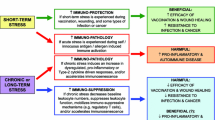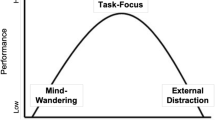Abstract
We aimed to investigate the effect of mild acute psychological stress on attention processing by adopting a consecutive task paradigm. In each trial, a probe stimulus (left or right arrow) was presented immediately after a mental arithmetic task (psychological stressor). Participants were asked to estimate whether the product of a multiplication term was above 10 or not, either with (stress block) or without (control block) time pressure and social-evaluative threat. When the probe was presented, participants were asked to judge the direction of the arrows. Increased subjective stress and negative affect were found for the stress versus control trials. For the probe task, reaction times were faster in the stress block than in the control block. Event-related potentials locked to the arrows revealed that (a) fronto-central N1 was enhanced in the stress block compared to the control block. This finding might indicate that stress amplified processes of early perception and that vigilance and sensory intake were augmented. (b) fronto-central N2 was enhanced in the stress block compared to the control block. This finding might reflect increased effort to control selective attention in completing the probe task. (c) less positive P3 was evoked in the stress block than in the control block. This finding potentially reflects the fact that fewer attentional resources were engaged in processing the probe, or that the activity associated with the process of response evaluation was decreased. In sum, mild acute psychological stress exerts a dissociable effect on the neural subprocesses of attention.






Similar content being viewed by others
References
Arnsten AF (2009) Stress signalling pathways that impair prefrontal cortex structure and function. Nat Rev Neurosci 10:410–422
Arnsten AF (2015) Stress weakens prefrontal networks: molecular insults to higher cognition. Nat Neurosci 18(10):1376–1385
Baumeister RF, Heatherton TF, Tice DM (1993) When ego threats lead to self-regulation failure: negative consequences of high self-esteem. J Pers Soc Psychol 64(1):141–156
Beck AT (1967) Depression clinical experimental and theoretical aspects. Hoeber, New York
Bertsch K, Böhnke R, Kruk MR, Richter S, Naumann E (2011) Exogenous cortisol facilitates responses to social threat under high provocation. Horm Behav 59:428–434
Bradley MM (2009) Natural selective attention: orienting and emotion. Psychophysiology 46(1):1–11
Bruin KJ, Wijers AA (2002) Inhibition, response mode, and stimulus probability: a comparative event-related potential study. Clin Neurophysiol 113(7):1172–1182
Covey TJ, Shucard JL, Violanti JM, Lee J, Shucard DW (2013) The effects of exposure to traumatic stressors on inhibitory control in police officers: a dense electrode array study using a Go/NoGo continuous performance task. Int J Psychophysiol 87(3):363–375
Dambacher M, Hübner R (2015) Time pressure affects the efficiency of perceptual processing in decisions under conflict. Psychol Res 79:83–94
Dedovic K, Renwick R, Mahani NK, Engert V, Lupien SJ, Pruessner JC (2005) The Montreal Imaging Stress Task: using functional imaging to investigate the effects of perceiving and processing psychosocial stress in the human brain. J Psychiatr Neurosci 30:319–325
Dennis-Tiwary TA, Egan LJ, Babkirk S, Denefrio S (2016) For whom the bell tolls: neurocognitive individual differences in the acute stress-reduction effects of an attention bias modification game for anxiety. Behav Res Ther 77:105–117
Di Russo F, Martínez A, Hillyard SA (2003) Source analysis of event-related cortical activity during visuo-spatial attention. Cereb Cortex 13(5):486–499
Dickerson SS, Kemeny ME (2004) Acute stressors and cortisol responses: a theoretical integration and synthesis of laboratory research. Psychol Bull 130:355–391
Dierolf AM, Fechtner J, Böhnke R, Wolf OT, Naumann E (2017) Influence of acute stress on response inhibition in healthy men: an ERP study. Psychophysiology 54(5):684–695
Eldar S, Bar-Haim Y (2010) Neural plasticity in response to attention training in anxiety. Psychol Med 40:667–677
Elling L, Schupp H, Bayer J et al (2012) The impact of acute psychosocial stress on magnetoencephalographic correlates of emotional attention and exogenous visual attention. PLoS One 7:e35767
Foley P, Kirschbaum C (2010) Human hypothalamus-pituitary-adrenal axis responses to acute psychosocial stress in laboratory settings. Neurosci Biobehav Rev 35:91–96
Folstein JR, Van Petten C (2008) Influence of cognitive control and mismatch on the N2 component of the ERP: a review. Psychophysiology 45:152–170
Füstös J, Gramann K, Herbert BM, Pollatos O (2012) On the embodiment of emotion regulation: interoceptive awareness facilitates reappraisal. Soc Cogn Affect Neurosci 8(8):911–917
Gao H, Cao B, Qi M, Wang J, Zhang Q, Li F (2016) Two stages of directed forgetting: electrophysiological evidence from a short-term memory task. Psychophysiology 53(6):806–813
Gao H, Qi M, Zhang Q (2017) Response inhibition is more effortful than response activation: behavioral and electrophysiological evidence. Neuroreport 28(7):404–407
Gao H, Qi M, Zhang Q (2018) Frontal control process in intentional forgetting: electrophysiological evidence. Front Neurosci 11:757
Gazzaley A, Clapp W, Kelley J, McEvoy K, Knight RT, D’Esposito M (2008) Age-related top-down suppression deficit in the early stages of cortical visual memory processing. P Natl Acad Sci 105(35):13122–13126
Gratton G, Coles MGH, Donchin E (1983) A New method for off-line removal of ocular artifact. Electroencephal Clin Neurophysiol 55:468–484
Henckens MJ, van Wingen GA, Joëls M, Fernández G (2011) Time-dependent corticosteroid modulation of prefrontal working memory processing. Proc Natl Acad Sci USA 108(14):5801–5806
Hum KM, Manassis K, Lewis MD (2013) Neural mechanisms of emotion regulation in childhood anxiety. J Child Psychol Psyc 54:552–564
Jonkman LM, Lansbergen M, Stauder JEA (2003) Developmental differences in behavioral and event-related brain responses associated with response preparation and inhibition in a go/nogo task. Psychophysiology 40(5):752–761
Kirschbaum C, Pirke KM, Hellhammer DH (1993) The ‘trier social stress test’—a tool for investigating psychobiological stress responses in a laboratory setting. Neuropsychobiology 28:76–81
Kirschbaum C, Kudielka BM, Gaab J, Schommer NC, Hellhammer DH (1999) Impact of gender, menstrual cycle phase, and oral contraceptives on the activity of the hypothalamus-pituitary-adrenal axis. Psychosom Med 61:154–162
Kogler L, Müller VI, Chang A et al (2015) Psychosocial versus physiological stress—meta-analyses on deactivations and activations of the neural correlates of stress reactions. Neuroimage 119:235–251
Kok A (1997) Event-related-potential (ERP) reflections of mental resources: a review and synthesis. Biol Psychol 45(1):19–56
Kopp B, Lange F (2013) Electrophysiological indicators of surprise and entropy in dynamic task-switching environments. Front Hum Neurosci 7:300
Kowalski-Trakofler KM, Vaught C, Scharf T (2003) Judgment and decision making under stress: an overview for emergency managers. Int J Emerg Manage 1:278–289
Larson-Prior LJ, Power JD, Vincent JL, Nolan TS, Coalson RS, Zempel J et al (2011) Modulation of the brain’s functional network architecture in the transition from wake to sleep. Prog Brain Res 193:277–294
Linden DE (2005) The P300: where in the brain is it produced and what does it tell us? Neuroscientist 11(6):563–576
Löw A, Weymar M, Hamm AO (2015) When threat is near, get out of here dynamics of defensive behavior during freezing and active avoidance. Psychol Sci 26:1706–1716
Mishra J, Hillyard SA (2009) Endogenous attention selection during binocular rivalry at early stages of visual processing. Vision Res 49:1073–1080
Moore DR, Pindus DM, Raine LB et al (2016) The persistent influence of concussion on attention, executive control and neuroelectric function in preadolescent children. Int J Psychophysiol 99:85–95
Olson RL, Chang YK, Brush CJ et al (2016) Neurophysiological and behavioral correlates of cognitive control during low and moderate intensity exercise. Neuroimage 131:171–180
Olver JS, Pinney M, Maruff P, Norman TR (2015) Impairments of spatial working memory and attention following acute psychosocial stress. Stress Health 31(2):115–123
Plessow F, Kiesel A, Kirschbaum C (2012) The stressed prefrontal cortex and goal-directed behaviour: acute psychosocial stress impairs the flexible implementation of task goals. Exp Brain Res 216(3):397–408
Pruessner JC, Dedovic K, Pruessner M et al (2010) Stress regulation in the central nervous system: evidence from structural and functional neuroimaging studies in human populations—2008 Curt Richter Award Winner. Psychoneuroendocrino 35:179–191
Qi M, Gao H, Guan L, Liu G, Yang J (2016) Subjective stress, salivary cortisol, and electrophysiological responses to psychological stress. Front Psychol 7:229
Qi M, Gao H, Liu G (2017) Effect of acute psychological stress on response inhibition: an event-related potential study. Behav Brain Res 323:32–37
Reinvang I, Nordby H, Nielsen CS (2000) Information processing deficits in head injury assessed with ERPs reflecting early and late processing stages. Neuropsychologia 38:995–1005
Righi S, Mecacci L, Viggiano MP (2009) Anxiety, cognitive self-evaluation and performance: ERP correlates. J Anxiety Disord 23:1132–1138
Riis JL, Chong H, Ryan KK, Wolk DA et al (2008) Compensatory neural activity distinguishes different patterns of normal cognitive aging. Neuroimage 39(1):441–454
Sandi C (2013) Stress and cognition. Wiley Interdiscip Rev Cogn Sci 4(3):245–261
Sänger J, Wascher E (2011) The influence of extrinsic motivation on competition-based selection. Behav Brain Res 224(1):58–64
Sänger J, Bechtold L, Schoofs D, Blaszkewicz M, Wascher E (2014) The influence of acute stress on attention mechanisms and its electrophysiological correlates. Front Behav Neurosci 8:353
Schaefer A, Gray JR (2007) A role for the human amygdala in higher cognition. Rev Neurosci 18(5):355–364
Schwabe L, Wolf OT (2013) Stress and multiple memory systems: from ‘thinking’ to ‘doing’. Trends Cogn Sci 17(2):60–68
Shackman AJ, Maxwell JS, McMenamin BW, Greischar LL, Davidson RJ (2011) Stress potentiates early and attenuates late stages of visual processing. J Neurosci 31:1156–1161
Starcke K, Wiesen C, Trotzke P, Brand M (2016) Effects of acute laboratory stress on executive functions. Front Psychol 7:461
Vandellen MR, Campbell WK, Hoyle RH, Bradfield EK (2011) Compensating, resisting, and breaking: a meta-analytic examination of reactions to self-esteem threat. Pers Soc Psychol Rev 15(1):51–74
Wang XD, Wang XL, Ma H (1999) Handbook of mental health assessment (supplement). China J Ment Health 12:238–241
Wang JJ, Rao HY, Wetmore GS et al (2005) Perfusion functional MRI reveals cerebral blood flow pattern under psychological stress. Proc Natl Acad Sci USA 102:17804–17809
Wang JJ, Korczykowski M, Rao HY et al (2007) Gender difference in neural response to psychological stress. Soc Cogn Affect Neursci 2:227–239
Watson D, Clark LA, Tellegen A (1988) Development and validation of brief measures of positive and negative affect—the Panas scales. J Pers Soc Psychol 54:1063–1070
Wauthia E, Rossignol M (2016) Emotional processing and attention control impairments in children with anxiety: an integrative review of event-related potentials findings. Front Psychol 7:562
Weerda R, Muehlhan M, Wolf OT, Thiel CM (2010) Effects of acute psychosocial stress on working memory related brain activity in men. Hum Brain Mapp 31(9):1418–1429
Acknowledgements
This study was supported by the National Natural Science Foundation of China (Grant no. 61472330) and the Fundamental Research Funds for the Central Universities (XDJK2016E025) and the Humanity and Social Sciences Youth Foundation of Ministry of Education of China (15YJC190017).
Author information
Authors and Affiliations
Corresponding authors
Ethics declarations
Conflict of interest
The authors declare no competing financial interests.
Rights and permissions
About this article
Cite this article
Qi, M., Gao, H. & Liu, G. The effect of mild acute psychological stress on attention processing: an ERP study. Exp Brain Res 236, 2061–2071 (2018). https://doi.org/10.1007/s00221-018-5283-6
Received:
Accepted:
Published:
Issue Date:
DOI: https://doi.org/10.1007/s00221-018-5283-6




